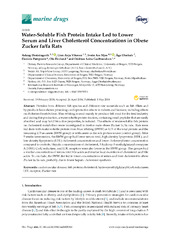| dc.contributor.author | Drotningsvik, Aslaug | en_US |
| dc.contributor.author | Vikøren, Linn Anja Slåke | en_US |
| dc.contributor.author | Mjøs, Svein Are | en_US |
| dc.contributor.author | Oterhals, Åge | en_US |
| dc.contributor.author | Pampanin, Daniela Maria | en_US |
| dc.contributor.author | Flesland, Ola | en_US |
| dc.contributor.author | Gudbrandsen, Oddrun Anita | en_US |
| dc.date.accessioned | 2018-11-23T13:51:37Z | |
| dc.date.available | 2018-11-23T13:51:37Z | |
| dc.date.issued | 2018-05-01 | |
| dc.Published | Drotningsvik A, Vikøren LAS, Mjøs SA, Oterhals Å, Pampanin DM, Flesland O, Gudbrandsen OA. Water-soluble fish protein intake led to lower serum and liver cholesterol concentrations in obese zucker fa/fa rats. Marine Drugs. 2018;16:149 | eng |
| dc.identifier.issn | 1660-3397 | |
| dc.identifier.uri | https://hdl.handle.net/1956/18733 | |
| dc.description.abstract | Proteins from different fish species and different raw materials such as fish fillets and by-products have shown promising cardioprotective effects in rodents and humans, including effects on cholesterol metabolism. Blue whiting is used mainly to produce fish meal for the feed industry and during this production, a water-soluble protein fraction, containing small peptides that are easily absorbed and may hold bioactive properties, is isolated. The effects of water-soluble fish protein on cholesterol metabolism were investigated in twelve male obese Zucker fa/fa rats. Rats were fed diets with water-soluble protein from blue whiting (BWW) as 1/3 of the total protein and the remaining 2/3 as casein (BWW group) or with casein as the sole protein source (control group). After 5 weeks intervention, the BWW group had lower serum total, high-density lipoprotein (HDL), and low-density lipoprotein (LDL) cholesterol concentrations and lower cholesteryl ester concentration compared to controls. Hepatic concentrations of cholesterol, 3-hydroxy-3-methylglutaryl coenzyme A (HMG-CoA) reductase, and LDL receptors were also lower in the BWW group. The groups had a similar concentration of serum total bile acids and similar fecal excretions of cholesterol and bile acids. To conclude, the BWW diet led to lower concentrations of serum and liver cholesterol in obese Zucker fa/fa rats, probably due to lower hepatic cholesterol synthesis. | en_US |
| dc.language.iso | eng | eng |
| dc.publisher | MDPI | eng |
| dc.rights | Attribution CC BY | eng |
| dc.rights.uri | http://creativecommons.org/licenses/by/4.0 | eng |
| dc.subject | Cardiovascular disease | eng |
| dc.subject | fish protein | eng |
| dc.subject | cholesterol | eng |
| dc.subject | hydroxymethylglutaryl-CoA reductases | eng |
| dc.subject | LDL receptor | eng |
| dc.subject | Zucker rats | eng |
| dc.title | Water-soluble fish protein intake led to lower serum and liver cholesterol concentrations in obese zucker fa/fa rats | en_US |
| dc.type | Peer reviewed | |
| dc.type | Journal article | |
| dc.date.updated | 2018-06-27T10:44:02Z | |
| dc.description.version | publishedVersion | en_US |
| dc.rights.holder | Copyright 2018 The Author(s) | |
| dc.identifier.doi | https://doi.org/10.3390/md16050149 | |
| dc.identifier.cristin | 1592891 | |
| dc.source.journal | Marine Drugs | |

